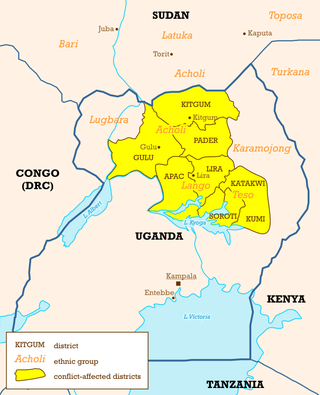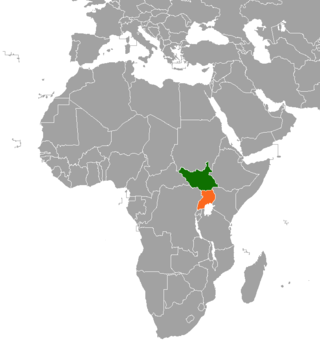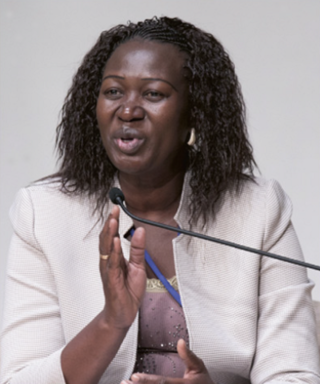Betty Ogwaro | |
|---|---|
 | |
Betty Achan Ogwaro is a South Sudanese politician in the government of South Sudan. Betty Achan Ogwaro was the former and the first minister of Agriculture and Forestry in the Republic of South Sudan
Betty Ogwaro | |
|---|---|
 | |
Betty Achan Ogwaro is a South Sudanese politician in the government of South Sudan. Betty Achan Ogwaro was the former and the first minister of Agriculture and Forestry in the Republic of South Sudan
Ogwaro holds a bachelor's degree in animal science with honors from the University of Juba. She also earned a master's degree in veterinary science from the University of Edinburgh. She has also worked towards degree in a microbiology at the University of Wolverhampton, in the United Kingdom. [1]
Betty Ogwaro served as Director of Animal Production for the Government of Southern Sudan until 1995 when she went into exile in the United Kingdom. [1] She was the chairperson for the Sudanese People Liberation Movement (SPLM) chapter office in the Midlands from 1999 to 2005, [1] and is one of the women leaders who successfully negotiated the inclusion of 25% minimum women representation at all levels of governance as part of the Comprehensive Peace Agreement. [2] Ogwaro is a founder of "Windows for Sudan", an NGO which seeks to promote the participation of Sudanese women in development and elevate their status in society. [3] She has also consulted for UNIFEM on women's issues. [4]
is a member of the mediation team negotiating peace settlement between the Lord's Resistance Army (LRA) and the government of Uganda, [5] and the first Sudanese woman to challenge Joseph Kony, the LRA's top leader, face-to-face for the group's atrocities in the Sudan and their lack of commitment to the peace process. [2] In 2007, Ogwaro served as president of the Southern Sudanese Women's Parliamentarian League, which advances the participation of Sudanese women leaders in politics and decision making. [1] She was also the chair of the Southern Sudanese Women Caucus, where influential women's organizations work to respond to the needs of Sudanese communities. [1] She was a member of several committees, including specialized committee for Gender, Social Welfare, Youth and Sports. [1] She combines her parliamentarian work with promoting women in agriculture. [3]
In 2007 Salva Kiir Mayardit appointed her State Minister for Agriculture, Animal Resources, Forestry, Cooperative and Rural Development in Eastern Equatoria State. [6] progressing to become the Government of The Republic of South Sudan National Minister for Agriculture and Forestry in 2011. [7]

The Lord's Resistance Army insurgency is an ongoing conflict between the Lord's Resistance Army (LRA), a Ugandan militant religious extremist group, against the government of Uganda. Following the Ugandan Civil War, militant Joseph Kony formed the Lord's Resistance Army and launched an insurgency against the newly installed President Yoweri Museveni. The stated goal was to establish a Christian state based on the Ten Commandments. Currently, there is low-level LRA activity in eastern areas of the Democratic Republic of the Congo and the Central African Republic. Kony proclaims himself the 'spokesperson' of God and a spirit medium.
Joseph Rao Kony is a Ugandan militant and warlord who founded the Lord's Resistance Army (LRA), designated as a terrorist group by the United Nations Peacekeepers, the European Union, and various other governments including the United Kingdom and United States of America.

Central Equatoria is a state in South Sudan. With an area of 43,033 square kilometres (16,615 sq mi), it is the smallest of the original South Sudanese states. Its previous name was Bahr al-Jabal, named after a tributary of the White Nile that flows through the state. It was renamed Central Equatoria in the first Interim Legislative Assembly on 1 April 2005 under the government of Southern Sudan. Central Equatoria seceded from Sudan as part of the Republic of South Sudan on 9 July 2011. The state's capital, Juba, is also the national capital of South Sudan. On October 2, 2015, the state was split into three states: Jubek, Terekeka, and Yei River. The state of Central Equatoria was re-established by a peace agreement signed on 22 February 2020.

Betty Oyella Bigombe, also known as Betty Atuku Bigombe, is a Ugandan politician who served as the Senior Director for Fragility, Conflict, and Violence at the World Bank from 2014 to 2017. She was appointed in June 2014. From May 2011 until June 2014, she was the State Minister for Water Resources in the Uganda Cabinet. She was appointed on 27 May 2011. She concurrently served as the elected Member of Parliament (MP), representing Amuru District Women's Constituency. She resigned from the two appointments on 1 June 2014.
Samson Lukare Kwaje was a South Sudanese politician and civil servant.
The period from 2000 to 2006 of the Lord's Resistance Army insurgency in northern Uganda begins with the assault of the Uganda People's Defence Force (UPDF) upon LRA strongholds in South Sudan. This in turn led to a series of retaliatory attacks by the Lord's Resistance Army of an intensity not seen to since the mid-1990s. International awareness of the conflict gradually grew and in September 2005, the International Criminal Court issues warrants for the arrest of senior LRA commanders, including Joseph Kony.

The Juba talks were a series of negotiations between the government of Uganda and the Lord's Resistance Army rebel group over the terms of a ceasefire and possible peace agreement. The talks, held in Juba, the capital of autonomous Southern Sudan, began in July 2006 and were mediated by Riek Machar, the Vice President of Southern Sudan. The talks, which had resulted in a ceasefire by September 2006, were described as the best chance ever for a negotiated settlement to the 20-year-old war. However, LRA leader Joseph Kony refused to sign the peace agreement in April 2008. Two months later, the LRA carried out an attack on a Southern Sudanese town, prompting the Government of Southern Sudan to officially withdraw from their mediation role.

The Lord's Resistance Army (LRA) is an extremist organization operating in Central Africa and East Africa. Its origins were in the Ugandan insurgency (1986–1994) against President Yoweri Museveni, during which Joseph Kony founded the LRA in 1987.

The States of South Sudan were created out of the three historic former provinces of Bahr el Ghazal (northwest), Equatoria (southern), and Greater Upper Nile (northeast). The states are further divided into 79 counties.

South Sudan and Uganda are neighboring states with strong cultural economic and political ties. The South Sudan and the neighbouring state of Uganda enjoy relatively strong cultural, political, and economic ties. As South Sudan neared independence, both states begun to take advantage of increased opportunities for trade, development and educational exchanges. The rebel group Lord's Resistance Army (LRA), however, continues to operate in the border areas between South Sudan, the Democratic Republic of Congo and Uganda.

Ann Itto Leonardo is a South Sudanese politician. She was previously the Minister of Agriculture and Forestry for the South Sundanese government, as well as the acting secretary-general of the Sudan People’s Liberation Movement.
Agnes Kwaje Lasuba is a South Sudanese politician.

Awut Deng Achuil is a South Sudanese politician who serves as the minister of general education and instruction in the Revitalised Transitional Government of National Unity (R-TGoNU). She is the first female Minister of Education for South Sudan and was previously Minister of Foreign Affairs and International Cooperation from August 2019 until March 2020.
Clement Wani Konga is a Mundari leader who fought in the Anyanya independence movement in the south of Sudan in 1969−72. He then joined the army of Sudan and rose to the rank of major general. In 2004 he made peace with the Sudan People's Liberation Movement (SPLM) and was appointed interim governor of Central Equatoria in South Sudan. In August 2015 he was dismissed from his post by president Salva Kiir Mayardit. He continued to be active as chairperson of the Mundari Community.
Ajonye Perpetua Paya is a South Sudanese constitutional lawyer, judge and human rights activist. Until 2013 she was a first class justice in the South Sudan judiciary. She assisted in drafting the 2005 interim constitution of Sudan. She served in the cabinet of Central Equatoria State in 2011, then in the cabinet of President Salva Kiir Mayardit, who dismissed her in May 2013. Since then she has held leadership positions in the South Sudan Law Society and has often spoken on civil rights issues including women's rights and gender-based violence. In 2023 she headed the Secretariat of the Judicial Reform Committee (JRC) of South Sudan.

The South Sudanese Civil War was a multi-sided civil war in South Sudan fought from 2013 to 2020, between forces of the government and opposition forces. The Civil War caused rampant human rights abuses, including forced displacement, ethnic massacres, and killings of journalists by various parties. Since its end South Sudan has been governed by a coalition formed by leaders of the former warring factions, Salva Kiir Mayardit and Riek Machar. In 2024, the country continues to recover from the war while experiencing ongoing and systemic ethnic violence.
The following lists events that happened during 2006 in Sudan.
The Regional Cooperation Initiative for the elimination of the LRA (RCI-LRA) with its military arm, the African Union Regional Task Force was a multi-national operation to counter the Lord's Resistance Army (LRA). On 22 November 2011 the AU Peace and Security Council authorized the RCI-LRA with the mandate to "strengthen the operational capabilities of the countries affected by the atrocities of the LRA, create an environment conducive to the stabilization of the affected areas, free of LRA atrocities, and facilitate the delivery of humanitarian aid to affected areas." The United Nations provided logistical support, the European Union and African Union contributed additional funding, and the United States provided non-combat military and strategic support.
Operation Thunderbolt was the codename for a military offensive by the South Sudanese SPLA rebel group and its allies during the Second Sudanese Civil War. The operation aimed at conquering several towns in Western and Central Equatoria, most importantly Yei, which served as strongholds for the Sudanese Armed Forces (SAF) and helped the Sudanese government to supply its allies, the Ugandan insurgents of the WNBF and UNRF (II) based in Zaire. These pro-Sudanese forces were defeated and driven from Zaire by the SPLA and its allies, namely Uganda and the AFDL, in the course of the First Congo War, thus allowing the SPLA to launch Operation Thunderbolt from the Zairian side of the border. Covertly supported by expeditionary forces from Uganda, Ethiopia, and Eritrea, the SPLA's offensive was a major success, with several SAF garrison towns falling to the South Sudanese rebels in a matter of days. Yei was encircled and put under siege on 11 March 1997. At the same time, a large group of WNBF fighters as well as SAF, FAZ, and ex-Rwandan Armed Forces soldiers was trying to escape from Zaire to Yei. The column was ambushed and destroyed by the SPLA, allowing it to capture Yei shortly afterward. Following this victory, the South Sudanese rebels continued their offensive until late April, capturing several other towns in Equatoria and preparing further anti-government campaigns.

The Acholi people are a Nilotic ethnic group of Luo peoples, found in Magwi County in South Sudan and Northern Uganda, including the districts of Agago, Amuru, Gulu, Kitgum, Nwoya, Lamwo, Pader and Omoro District. The Acholi were estimated to number 2.3 million people and over 45,000 more were living in South Sudan in 2000.